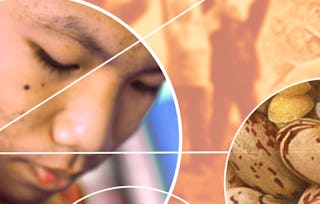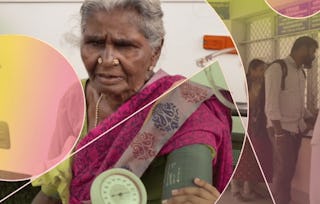Diabetes and obesity are growing health problems in rich and poor countries alike. With this course you will get updated on cutting-edge diabetes and obesity research including biological, genetic and clinical aspects as well as prevention and epidemiology of diabetes and obesity. All lectures are provided by high-profile scientists from one the world's leading universities in diabetes research.

Diabetes - a Global Challenge

751 reviews
Skills you'll gain
- Biology
- Nutrition and Diet
- Public Health
- Clinical Nutrition
- Epidemiology
- Pharmacology
- Molecular Biology
- Patient Treatment
- Public Health and Disease Prevention
- Immunology
- Preventative Care
- Exercise Science
- Pharmaceuticals
- Medical Science and Research
- Drug Development
- Endocrinology
- Physiology
- Chronic Diseases
- Skills section collapsed. Showing 11 of 18 skills.
Details to know

Add to your LinkedIn profile
See how employees at top companies are mastering in-demand skills

There are 12 modules in this course
We are delighted to be able to welcome you to Diabetes – a Global Challenge. In module 1, we will focus on the epidemiology of diabetes and obesity which we lead us to this week discussion topic: "What the greatest diabetes challenges of our time might be in your opinion?" You can either post your opinion as text or as a link to a short video statement.
What's included
4 videos2 readings1 assignment
We will start module 2 together by discussing physical activity, its influence on obesity, insulin resistance and the prevention of diabetes.
What's included
4 videos1 assignment
During module 3 we will focus on physiological regulation of plasma glucose. Professor Jens Juul Holst will guide you through the complex regulation of glucose in humans. This will be difficult but hang on you will see the usefulness of what you learn in this module during the subsequent modules where we will discuss the incretins and treatment of hyperglycaemia.
What's included
3 videos1 assignment
Incretin biology is now applied in treating subjects with diabetes and recently approved by the FDA for weight reduction. But what do they do? Don't hesitate to start watching the videos because in this module you will learn all about the incretin lead by Professor Jens Juul Holst.
What's included
3 videos1 assignment
We hope that you enjoyed the previous modules about glucose regulation and incretin biology though they may seem more advanced compared to the first modules. We hope you stay with us and learn more about Clinical Manifestation of Diabetes and Treatment by Professor Allan Vaag and Treatment of Hyperglycemia by Professor Sten Madsbad.
What's included
8 videos2 assignments
Inflammatory beta-cell destruction in diabetes by professor Thomas Mandrup-Poulsen. During this module we Professor Mandrup-Poulsen will guide you through cytokines mediated destruction of the pancreatic beta-cells furthermore their potentiality as drugs targets.
What's included
3 videos1 assignment
Genetics are important for understanding and treating diabetes. In this module Professor Torben Hansen will discuss the genetic aspects of diabetes
What's included
4 videos1 assignment
Translational medicine? Learn more by watching our new module by Assistant Professor Torekov. In this module we will discuss two cases of translational aspects to highlight its importance. In other words we will go from bench to bedside.
What's included
2 videos1 assignment
Have you ever thought "how to develop a antidiabetic agent?" Professor Birgitte Holst will take you through some potential drug targets and how to use G-protein coupled receptor for treatment of diabetes.
What's included
2 videos1 assignment
Module 10 will focus on 'Stem Cell Based Therapy of Diabetes' and the question 'What are the advantages and disadvantages in cell therapy of diabetes?' is raised by Professor Ole Dragsbæk-Madsen.
What's included
3 videos1 assignment
Exercise has many beneficial effects - but how does it actually work? Professor Bente Klarlund will take you through the latest scientific research on how the exercise of skeletal muscles affect our organs and entire body.
What's included
3 videos1 assignment
Try to summarize all what you have learned watching these modules and have fun with writing a peer-graded assignment. The goal is simply to integrate what you have learned and put this together in a practical solution based manner.
What's included
1 reading1 peer review
Instructors



Offered by
Explore more from Public Health
 Status: Preview
Status: PreviewUniversity of Copenhagen
 Status: Free
Status: FreeUniversity of Copenhagen
 Status: Preview
Status: PreviewThe University of Sydney
 Status: Free Trial
Status: Free TrialImperial College London
Why people choose Coursera for their career

Felipe M.

Jennifer J.

Larry W.

Chaitanya A.
Learner reviews
- 5 stars
83.33%
- 4 stars
13.06%
- 3 stars
2.26%
- 2 stars
0.53%
- 1 star
0.80%
Showing 3 of 751
Reviewed on Sep 14, 2019
It is really a very nice course. It gives overall important information in brief about diabetes. Very good for those who want to do something specifically in Diabetes.!!
Reviewed on Jun 2, 2020
Great course! I would recommend this course for anyone who seeks a General understanding of the diabetes with special emphasis on the major studies regarding the treatment approaches.
Reviewed on May 30, 2020
Really helpful course especially for me as doctor, guides treatment and prevention of diabetes and obesity. It is advanced and evidence based.

Open new doors with Coursera Plus
Unlimited access to 10,000+ world-class courses, hands-on projects, and job-ready certificate programs - all included in your subscription
Advance your career with an online degree
Earn a degree from world-class universities - 100% online
Join over 3,400 global companies that choose Coursera for Business
Upskill your employees to excel in the digital economy
Frequently asked questions
To access the course materials, assignments and to earn a Certificate, you will need to purchase the Certificate experience when you enroll in a course. You can try a Free Trial instead, or apply for Financial Aid. The course may offer 'Full Course, No Certificate' instead. This option lets you see all course materials, submit required assessments, and get a final grade. This also means that you will not be able to purchase a Certificate experience.
When you purchase a Certificate you get access to all course materials, including graded assignments. Upon completing the course, your electronic Certificate will be added to your Accomplishments page - from there, you can print your Certificate or add it to your LinkedIn profile.
Yes. In select learning programs, you can apply for financial aid or a scholarship if you can’t afford the enrollment fee. If fin aid or scholarship is available for your learning program selection, you’ll find a link to apply on the description page.
More questions
Financial aid available,
¹ Some assignments in this course are AI-graded. For these assignments, your data will be used in accordance with Coursera's Privacy Notice.

